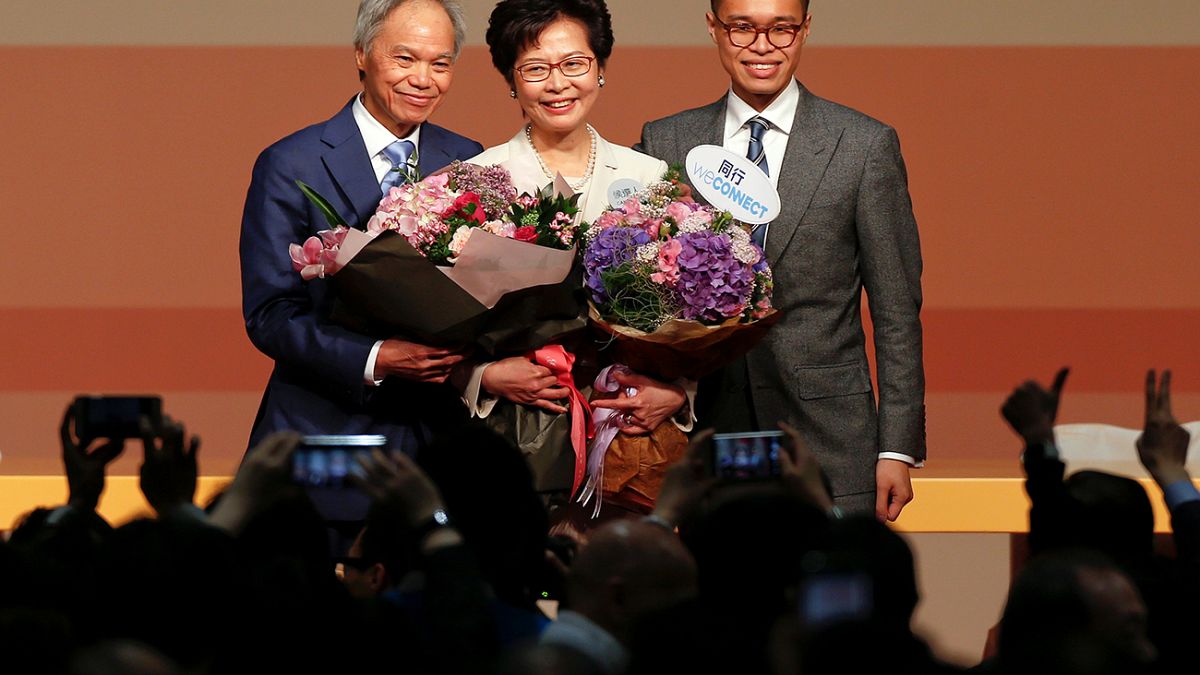Critics say Carrie Lam's appointment was a selection and not an election.
A Beijing-backed civil servant has been chosen as the next leader of Hong Kong.
Carrie Lam’s appointment comes amid accusations that Beijing is meddling and denying the financial hub a more populist leader.
Lam will become Hong Kong’s first female chief executive when she takes office on July 1.
The results:
- 777 votes – Carrie Lam
- 365 votes – John Tsang
- 21 votes – retired judge Woo Kwok-hing
Hundreds of Lam supporters waved China flags and cheered inside and outside the venue after Lam’s win.
Hong Kong’s former No. 2 official, Carrie Lam, is elected as the city’s chief executive https://t.co/3OD9m9Z9BLpic.twitter.com/0TS64FBV7h
— Bloomberg (@business) 26 mars 2017
How is Hong Kong’s leader chosen?
The majority of the China-ruled city’s 7.3 million people have no say in deciding their leader.
The candidate is chosen from among several by a 1,200-person “election committee” stacked with pro-Beijing and pro-establishment loyalists.
#UPDATE Beijing favourite Carrie Lam wins Hong Kong leadership: media counts
https://t.co/EkY9Ua3guupic.twitter.com/YJNwvcLiJi— AFP news agency (@AFP) 26 mars 2017
Scuffles
Some broke out outside the voting centre between protesters and a large contingent of police.
Metal barricades were used to keep the demonstrators well away.
The activists denounced Beijing’s “interference” amid widespread reports of unprecedented lobbying of voters to back Lam, rather than Tsang, chanting “I want universal suffrage” when the result was announced.
“Lies, coercion, whitewash,” read one banner. A huge yellow banner calling for full democracy was hung from the Lion Rock peak overlooking the city.
“The central government has intervened again and again,” said Carmen Tong, a 20-year-old student. “It is very unjust.”
.
joshuawongcf</a> amid protests outside polling centre for 1st <a href="https://twitter.com/hashtag/HongKong?src=hash">#HongKong</a> chief exec election since <a href="https://twitter.com/hashtag/OccupyCentral?src=hash">#OccupyCentral</a> <a href="https://twitter.com/hashtag/UmbrellaRevolution?src=hash">#UmbrellaRevolution</a> <a href="https://twitter.com/hashtag/CE2017?src=hash">#CE2017</a> <a href="https://t.co/oYZJwT8Irw">pic.twitter.com/oYZJwT8Irw</a></p>— Hoe Pei Shan 何佩珊 (PeiShanBT) 26 mars 2017
Hong Kong and China
Since Hong Kong returned to Chinese rule in 1997, Beijing has gradually increased control over it even though China had promised wide-ranging freedoms and autonomy under a “one country, two systems” arrangement.
However, all of Hong Kong’s three other post-handover leaders have struggled to balance the demands of China’s stability-obsessed Communist Party leaders with the wish of many residents to preserve the global financial hub’s liberal values and rule of law that have long underpinned its economic success.
Lam – what the analysts are saying
Many, including opposition democrats, fear Lam will continue the tough policies of staunchly pro-Beijing incumbent Leung Chun-ying.
The controversial figures ordered the firing of tear gas on pro-democracy protesters in 2014 and is not seen as defending Hong Kong’s autonomy and core values.
“Lam does not have a strong foundation nor will she have a honeymoon after she is elected,” says political scientist Ivan Choy.
“But whether she will further divide society we still have to wait and see what she does, whether she will continue the approach of Leung.”
The business
The upheavals with Beijing over Hong Kong’s autonomy and democratic reforms have angered a new generation and weighed heavily on the city’s economy.
Some see China’s creeping interference in many areas of the city, including business, media, politics, academia and the judiciary as tarnishing the city’s international business allure.
Hong Kong was currently ranked 33rd globally by the World Bank in 2015.
Hong Kong’s richest man, Li Ka-shing, warned this week the city could not afford another five years of strife.
Hong Kong’s proximity to China has been a bonus, bringing Chinese investment and spending. However, businesses have also faced growing competition from mainland firms in core service sectors like services and property.
